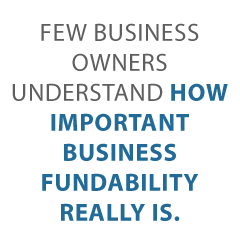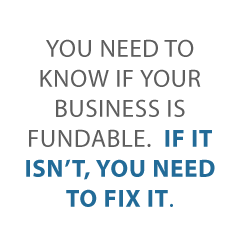Have you ever wondered what exactly it is that lenders are looking for when it comes to approving a loan? Is it just your credit score, or is there more that comes into play? Why do you keep getting denied despite a strong, successful business with plenty of profit? How do they measure business fundability?
The answers to these questions can vary from lender to lender.
What are Lenders Looking at to Determine Business Fundability?
Honestly there is really no way to know for sure what exact information a lender is going to choose to use in their decision making. What you can do, however, is learn everything you can about business fundability and what affects it. By doing that, you can begin to make changes where possible in an effort to ensure anything a lender sees is as positive as possible.
Check out our best webinar with its trustworthy list of seven vendors to help you build business credit.
What is Business Fundability?
To do this, you first have to know exactly what business fundability is. The easiest way to explain it is to say it is how worthy of credit your business is. If a lender considers your business to be fundable, it means they see your business as a low credit risk. However, everything that goes into being fundable is much more complicated.
It is easiest to start at the beginning. Believe it or not, business fundability actually starts with how your business is set up.
Business Fundability: The Set Up
These are the things that lenders consider, either directly or indirectly, in relation to how your business is set up. They all work together to build the credibility and legitimacy of your business.
Contact Information
The first step in setting up a foundation on which to build business fundability is to get your business its own phone number, fax number, and address. What is surprising to some, is that this doesn’t mean you have to get a separate phone line, or even a separate location. You can run your business from your home or on your computer, and you do not even have to have a fax machine. Find out more about how this here and here.
EIN
Your business needs and EIN. This is an identifying number for your business that works the same way your SSN works for you personally. It looks more credible to use this number rather than your SSN for business loan applications. Having an EIN is also important for building business credit, as it separates your business accounts from your personal accounts. You can get one for free from the IRS.
Incorporate
This is the most important step in fundability thus far. Incorporating your business as an LLC, S-corp, or corporation is necessary to fundability. It lends credence to your business as one that is legitimate. In addition, it also offers some protection from liability.
Which option you choose has more to do with your budget and how much liability protection you need than it does for fundability. The best thing to do is discuss the issue with your attorney or a tax professional.
Incorporation has to happen as soon as possible. Time in business counts toward fundability and for business credit. This starts over at incorporation, regardless of how long your business has been in operation before incorporation. Not only that, but any positive business credit history you have up until the point of incorporation will be lost as well.
Business Bank Account
You have to open a separate, dedicated business bank account. There are a few reasons for this. First, it will help you keep track of business finances. It will also help you keep them separate from personal finances for tax purposes.
In addition, there are several types of funding you cannot get without a business bank account. Some lenders and credit cards want to see one. Also, you cannot get a merchant account without a business account at a bank. That means, you cannot take credit cards payments. Consumers tend to spend more when they can pay by credit card.
Check out our best webinar with its trustworthy list of seven vendors to help you build business credit.
Licenses
For a business to be legitimate it has to have all of the necessary licenses it needs to run legally. If it doesn’t, red flags are going to fly up all over the place. Do the research you need to do to ensure you have all of the licenses necessary to legitimately run your business at the federal, state, and local levels.
Website
How does a business website affect fundability? Here’s how. In today’s world, we all run to the internet first for virtually everything. For most businesses, the website is the first impression you make on anyone, including lenders. If it appears to be unprofessional, it will cause problems.
Spend the time and money necessary to ensure your website is professionally designed and works well. Pay for hosting too. Don’t use a free hosting service. Also, your business needs a dedicated business email address. Make sure it has the same URL as your Website. Don’t use a free service such as Yahoo or Gmail.
Business Fundability: Business Credit Reports
This is what most business owners think about when it comes to business fundability. That is the credit report, much like your consumer credit report, that details the credit history of your business. It is a tool to help lenders determine how credit worthy your business is.
Where do business credit reports come from? There are a lot of different places, but the main ones are Dun & Bradstreet, Experian, Equifax, and FICO SBSS. Since you have no way of knowing which one your lender will choose, you need to make sure all of these reports are up to date and accurate.
Not only that, but you need to be sure you actually have business credit. It does not build passively as a result of credit transactions in the same way consumer credit does. That set-up for fundability? It is necessary to begin building business credit as well. After you have that, you have to get accounts reporting, which is a whole other process. Find out more about that here.
Other Business Data Agencies
In addition to the business credit reporting agencies that directly calculate and issue your credit reports, there are other business data agencies that affect those reports indirectly. Two examples of this are LexisNexus and The Small Business Finance Exchange. These two agencies gather data from a variety of sources, including public records. This means they could have access to information relating to automobile accidents, liens, and more. While you may not be able to access or change the data the agencies have, you can ensure that any new information they receive is positive. Enough positive information can help counteract any negative information from the past.
Identification Numbers
In addition to the EIN, there are other identifying numbers related to business credit reports. You need to be aware that these numbers exist. Some of them are simply assigned by the agency. One, however, you have to apply for. It is pertinent that you do this.
That number is a D-U-N-S number from Dun & Bradstreet. D&B is the largest and most commonly used business credit reporting agency. Every credit file in their database has a D-U-N-S number. To get a D-U-N-S number, you have to apply for one through the D&B website.
Business Credit History
Your credit history has everything to do with everything related to your credit score, which is a huge factor in the fundability of your business.
Your credit history consists of a number of things including:
- How many accounts are reporting payments?
- How long have you had each account?
- What type of accounts are they?
- How much credit are you using on each account versus how much is available?
- Are you making your payments on these accounts consistently on-time?
The more accounts you have reporting on-time payments, the stronger your credit score will be.
Business Information
On the surface, it seems obvious that all of your business information should be the same across the board everywhere you use it. However, when you start changing things up like adding a business phone number and address and incorporating, you may find that some things slip through the cracks.
This is a problem because a ton of loan applications are turned down each year due to fraud concerns simply because things do not match up. Maybe your business licenses have your personal address but now you have a business address. Fix it. Do some of your credit accounts have a slightly different name or a different phone number listed than what is on your loan application? Make sure your insurances all have the correct information, too.
The key to this piece of the business fundability is to monitor your reports frequently. When it comes to business credit reports, you can monitor through the reporting agencies directly, or save money by going here.
Financial Statements
This covers a broad spectrum. First, there is the obvious. Both your personal and business tax returns need to be in order. Not only that, but you need to be paying your taxes, both business and personal. But wait, there’s more.
Business Financials
It is best to have an accounting professional prepare regular financial statements. Having an accountant’s name on financial statements lends to the legitimacy of your business. If you cannot afford them monthly or quarterly, at least have professional statements prepared annually. This way, they will be ready whenever you need them.
Personal Financials
Often this is simply tax returns for the previous three years. That is the bare minimum you will need. Other information lenders may ask for include check stubs and bank statements.
Bureaus
There are several other agencies that hold information related to your personal finances that you need to know about as well. One example is ChexSystems. It keeps up with bad check activity and makes a difference when it comes to your bank score. If you have too many bad checks, you will not be able to open a bank account. That will cause serious fundability issues.
For this point, everything comes into play. Have you ever been convicted of a crime? Do you have a bankruptcy or short sell on your record? How about liens or UCC filings? All of this can and will play into business fundability.
Personal Credit History
Your personal credit score from Experian, Equifax, and Transunion all matter. You have to have your personal credit in order because it will definitely affect business fundability. If it isn’t the best, get to work on it now. The number one way to get a strong personal credit score or improve a weak one is to make payments regularly on-time.
Also, make sure you monitor your personal credit regularly to ensure mistakes are corrected and that there are no fraudulent accounts being reported. You can get one free copy of your personal credit report annually.
Business Fundability: Application Process
So much plays into this that you may not even think about. First, consider the timing of the application. Is your business currently fundable? If not, do some work to change that. Next, make sure that your business name, business address, and ownership status are all verifiable. Lastly, make sure you choose the right lending product for your business and your needs. Do you need a traditional loan or a line of credit? Would a working capital loan or expansion loan work best for your needs? Choosing the right product to apply for can make all the difference.
Check out our best webinar with its trustworthy list of seven vendors to help you build business credit.
Do Lenders Really Look at All of These Things for Business Fundability? 
Maybe not directly. For traditional lenders, your personal credit and finances are going to directly affect your ability to get a business loan for sure. Your business credit may be able to help you get a better rate, or push you over the approval line if personal credit isn’t as great as it needs to be. Private lenders may lean more toward business credit.
Neither is likely to pull, or to even be able to pull, a report directly from another agency however. Furthermore, most will not seek out public records. However, those things can show up on and affect your credit reports. Not only that, but if in the process a lender sees a discrepancy in name or address, it will throw up red flags.
Even something minor like a poorly put together website, when coupled with a few other seemingly minor issues, can be enough to put you out of the running for a business loan all together. It’s best to have a thorough understanding of what business fundability is and what affects it, so you can keep any issues, either minor or major, from causing problems.
Business Fundability: How it All Ties Together
Truly, few business owners understand how important business fundability really is. Even if they do, they are not sure what to do about it. However, if you set up things right, pay attention to what’s out there, and ensure all the information is as correct as possible, you have a good start. The only way to do this is to consistently monitor credit reports. If your business credit isn’t the best, or if you do not yet have business credit, find out how to start and build strong business credit here.
The post How Do Lenders Measure Business Fundability? appeared first on Credit Suite.






